Faculty members honored with professorships, new scholars welcomed
University faculty members Susan Goldin-Meadow and Shulamit Ran have recently received distinguished service professorships, while five faculty members— Hans-Josef Klauck, Ben Lahey, Raymond Pierrehumbert, Kathryn Tanner and Yuri Tsivian—have received named professorships.
The University also welcomes three new faculty members whose appointments began Sunday, Jan. 1. They are: Christopher Gomez, Jean Decety and Robert Gooding-Williams.
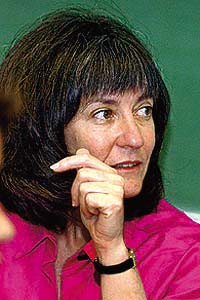 Susan Goldin-Meadow | |
Susan Goldin-Meadow, the Irving B. Harris Professor in Psychology and the College, has been named the Beardsley Ruml Distinguished Service Professor.
As a scholar who has done research in language-learning and cognitive development, Goldin-Meadow focuses on the use and meaning of gesture in her work.
Goldin-Meadow, who joined the Chicago faculty in 1976, has published extensively on gesture. She has found, for example, that children who have never heard a language can nevertheless make up their own gesture language, and that people who are blind and have never seen gesture, nevertheless gesture in much the same way sighted people do. Her work also has shown that students perceive information in math lessons that teachers convey unconsciously through their gestures.
She is the author of The Resilience of Language: What Gesture Creation in Deaf Children Tells Us About Language-Learning in General and Hearing Gesture: Our Hands Help us Talk and Think. She is past president of the Cognitive Development Society and chair of the Linguistics and Language Science Section of the American Association for the Advancement of Science.
Goldin-Meadow is the founding editor of Language Learning and Developmentand serves on the editorial boards of Cognitive Science, Cognitive Development and Gesture. She also is a fellow in the American Academy of Arts and Sciences.
Goldin-Meadow received a B.A. from Smith College in 1971, and an M.A. in 1972 and a Ph.D. in 1975, both in psychology, from the University of Pennsylvania.
Shulamit Ran, the William Colvin Professor in Music and the College, is now the Andrew MacLeish Distinguished Service Professor.
Ran, winner of the 1991 Pulitzer Prize in Composition, has been a member of the University faculty since 1973. A celebrated composer with special interest in the performance and study of contemporary music, Ran has served as Composer-in-Residence with the Chicago Symphony Orchestra and the Lyric Opera of Chicago.
 Shulamit Ran | |
Her recent works include “Supplications” for chorus and orchestra, which premiered in a 2002 performance by the American Composers Orchestra at Carnegie Hall; “Violin Concerto,” which premiered in a 2003 performance by violinist Ittai Shapira and conductor Charles Hazlewood with the Orchestra of St. Luke’s at Carnegie Hall; “Bach-Shards,” which was commissioned by the Brentano String Quartet; and “Under the Sun’s Gaze (Concerto da Camera III),” commissioned by the Koussevitzky Foundation and premiered in 2005 by the San Francisco Contemporary Players.
Current and future works include a chamber ensemble work for the Chicago Symphony MusicNOW series, a work for organ commissioned by the American Guild for Organists for its 2006 musical convention, and a triple concerto for the Peabody Trio.
Ran has been awarded most major honors given to composers in the United States, including those from the Martha Baird Rockefeller Fund, the Ford Foundation, the National Endowment for the Arts, the John Simon Guggenheim Memorial Foundation, the Fromm Music Foundation, WFMT radio, Chamber Music America and the Eastman School of Music.
Ran also is the recipient of five honorary doctorates, from Mount Holyoke College, Spertus Institute, Beloit College, the New School of Social Research and Bowdoin College.
Hans-Josef Klauck, Professor in the Divinity School and New Testament and Early Christian Literature in the Division of the Humanities, is now the Naomi Shenstone Donnelley Professor.
 Hans-Josef Klauck | |
Klauck, an ordained Franciscan priest, researches the New Testament and early Christian literature. His interests have been focused on the parables of Jesus, Paul’s Corinthian correspondence and the Johannine letters. In addition, he has specialized in the religious and social history of the Greco-Roman world as a background to New Testament studies.
Among the most recent of his 30 books are Ancient Letters and the New Testament: A Guide to Context and Exegesis; The Religious Context of Early Christianity: A Guide to Greco-Roman Religions; Magic and Paganism in Early Christianity: The World of the Acts of the Apostles; and Religion und Gesellschaft im frühen Christentum.
He is the editor of Herders Biblische Studien and Stuttgarter Biblische Studien, co-editor of Wissenschaftliche Untersuchungen zum Neuen Testament, Hermeneia und Evangelisch-Katholischer Kommentar zum Neuen Testament, New Testament editor for the new edition of Die Religion in Geschichte und Gegenwart and its English translation Religion in Past and Present and main editor for New Testament of the 24-volume Gruyter’s International Encyclopedia of the Bible. From 2003 to 2004, he was president of the international Studiorum Novi Testamenti Societas.
Klauck is currently working on an introduction to the New Testament apocryphal literature, the first volume of which, Apocryphal Gospels: An Introduction, was published in 2003.
He joined the University faculty in 2001, having taught before at several universities in Germany as well as the Dutch Reformed Theological School of the University of Pretoria in South Africa. Klauck earned his B.A. at the College Exaten in the Netherlands, his M.A. at the University of Bonn, and his Ph.D. and a Habilitation, or second doctorate at the University of Munich.
An authority on attention deficit disorder, disruptive behaviors and conduct problems in children and adolescents, Benjamin Lahey, has been named the Irving B. Harris Professor in Health Studies and Psychiatry.
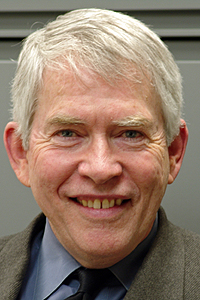 Benjamin Lahey | |
Lahey studies the epidemiology and development of child and adolescent mental disorders—how common they are, factors that increase risk, age of onset, availability of treatment and long-term outcomes of therapy. He is a pioneer in the ongoing nationwide effort to codify and standardize the tools psychologists use to describe these disorders, a crucial first step toward measuring the extent of the problem, evaluating therapies and understanding the genetics of conduct disorders.
The author of more than 160 journal articles and 35 book chapters, Lahey has edited several books, including volumes 1 through 14 of Advances in Clinical Child Psychology, and authored four textbooks, including the popular introductory text, Psychology: An Introduction, now in its eighth edition. He is on the board of editors for several leading journals, has received many honors, and served as president of the Southeastern Association for Behavior Therapy, the International Society for Research in Child and Adolescent Psychopathology, and Division 53 of the Society for Clinical Child and Adolescent Psychology.
Lahey earned his A.B. in psychology in 1967 from Davidson College and his Ph.D. in 1970 from the University of Tennessee, with additional clinical training at the Center for Psychological Services in Orlando, Fla. He taught at the University of Georgia for 15 years and joined the Chicago faculty as a Professor in Psychiatry and Section Chief of Psychology in 1993. He became a research associate at the National Opinion Research Center in 2000, and in 2005, he shifted his primary academic home to Health Studies.
Raymond Pierrehumbert, who studies the physics of climate, especially regarding the long-term evolution of the climates of Earth and Mars, has been appointed a Louis Block Professor in Geophysical Sciences and the College.
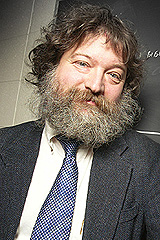 Raymond Pierrehumbert | |
Pierrehumbert was a lead author of the Intergovernmental Panel on Climate Change’s Third Assessment Report (1997-2001). He also was a member of the National Research Council’s Panel on Abrupt Climate Change and its Societal Impacts (2000-2001), and currently serves on the National Oceanic and Atmospheric Administration’s Panel on Abrupt Change. He was editor of the Journal of the Atmospheric Sciences from 1988 to 1991.
Pierrehumbert received his A.B. in physics, magna cum laude, in 1975 from Harvard University. He was a Knox Fellow in the Department of Applied Mathematics and Theoretical Physics at the University of Cambridge in England from 1976 to 1977, and received his Ph.D. in aeronautics and astronautics from the Massachusetts Institute of Technology in 1980.
He began his career as an assistant professor of meteorology at MIT, where he taught from 1980 to 1982. A research scientist at the National Oceanic and Atmospheric Administration from 1982 to 1988, Pierrehumbert also held concurrent appointments during that time at Princeton University’s programs in Atmospheric and Ocean Sciences and Applied and Computational Mathematics.
Pierrehumbert was a guest investigator at Stockholm Universitet in 1987 and 1988. He became a professor of geology and geophysics at Princeton in 1988, and joined the Chicago faculty the following year. He was a John Simon Guggenheim Memorial Foundation fellow at the Ecole Normale Superieur in Paris in 1996 and 1997, and the visiting director of research at Ecole Polytechnique in France in 2003 and 2004.
He now directs the Climate Systems Center, which was established with a $3.6 million grant from the National Science Foundation to develop software for rapidly conducting advanced climate simulations.
Kathryn Tanner, Professor in the Divinity School, is now the Dorothy Grant Maclear Professor.
Tanner’s research involves constructive Christian theology in the Protestant tradition, with the intent of addressing contemporary challenges to belief through the creative use of both the history of Christian thought and such interdisciplinary methods as critical, social and feminist theory.
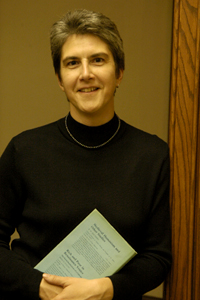 Kathryn Tanner | |
Tanner’s work reaches a wide cross section of readers, with many of her books geared toward academic and mainstream audiences. She is known for combining theology with non-traditional dialogue partners such as urban studies, postmodern geography, cultural studies and the social sciences.
Her books God and Creation in Christian Theology: Tyranny or Empowerment? and The Politics of God: Christian Theologies and Social Justice discuss the coherence and practical force of Christian beliefs about God’s relation to the world. Theories of Culture: A New Agenda for Theology explores the relevance of cultural studies for rethinking theological method. Her brief systematic theology, Jesus, Humanity and the Trinity, focuses on the incarnation.
Her latest book, Economy of Grace, explores the intersections between theology and economics. She currently is working on the Oxford Handbook of Systematic Theology, and on an expanded version of her systematic theology, to be delivered as the Warfield Lectures at Princeton Seminary in 2007.
Tanner joined the faculty of the Divinity School in 1994. She earned all of her degrees - a B.A., M.A., M.Phil. and Ph.D.- from Yale University.
Yuri Tsivian, Professor in Art History, Slavic Languages & Literatures, Comparative Literature, Cinema & Media Studies and the College, is now the William Colvin Professor.
Tsivian works primarily in the areas of Russian and Soviet cinema, international silent film, semiotics of cinema, and theory and history of film style. Born in Riga, the capital of Latvia, Tsivian studied film at the Institute for the History of Arts in Moscow and earned his doctorate in film studies from the Institute of Theater, Music and Cinema in Leningrad. He joined the Chicago faculty in 1996.
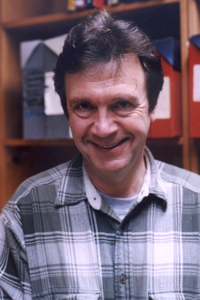 Yuri Tsivian | |
Tsivian’s books include Silent Witnesses: Russian Films, 1908-1919; Istoricheskaja Recepcija Kino, as well as the English version, Early Cinema in Russia and its Cultural Reception; and in collaboration with Yuri Lotman, Dialogues with the Screen. His most recent book is Ivan the Terrible.
Tsivian also is involved in the restoration and digitization of silent films. His voice can be heard on the audio essay for the DVD version of Dziga Vertov’s Man with the Movie Camera, on the audio-visual essay on Einstein’s Ivan the Terrible, and on both the English and Russian versions of the CD-ROM Immaterial Bodies: Cultural Anatomy of Early Russian Films, for which he received the 2001 award for best interactive learning project from the British Academy of Film and Television Arts.
He is currently at work on the book Lines of Resistance: Dziga Vertov and the Twenties.
Jean Decety, a scholar who has made major contributions to the study of the neuroscience of empathy, as well as other topics related to neurology, has joined the Chicago faculty as a Professor in Psychology.
He is the author of numerous articles on other topics such as the neural basis for cooperation and competition and does research on schizophrenia.
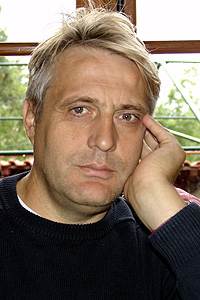 Jean Decety | |
Decety comes to the University from the University of Washington, where he was a professor and head of the Social-Cognitive Neuroscience Lab, a position he held since 2001. Prior to that appointment, he held research positions at the Institute for Medical Research.
His work has led to new understandings of empathy and has included fMRI studies and behavioral experiments, in which he examined several variables that are susceptible to modulate empathetic responses. One study on the perception of others’ pain is published in a NeuroImage journal paper and titled “How Do We Perceive the Pain of Others: A Window into the Neural Processes Involved in Empathy.”
Decety and his lab team also focus on the cognitive neuroscience of imitation and the neurocognitive mechanisms underlying perspective taking, which, like empathy, are essential aspects in human social communication. According to Decety, these processes are fundamental to compassionate interaction and serve as the foundation of culture.
He received a Ph.D. in 1989 from the University Bernard Lyon I in France and a Habilitation, or second doctorate, in 1994. He did his undergraduate work at the University of Lyon, and his post-doctoral work in Sweden.
Christopher Gomez, a leading authority on the molecular and cellular mechanisms of neurodegenerative disease, has been appointed Professor and Chairman of Neurology, effective Jan. 1.
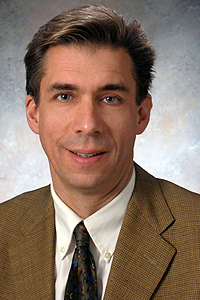 Christopher Gomez | |
Gomez joins the Chicago faculty after serving as a professor of neurology at the University of Minnesota. He also was director of the laboratory of ion channel disorders and neurodegeneration and associate head for research affairs in neurology.
Gomez is widely recognized for his clinical expertise in the treatment of ataxias and his research on the molecular and genetic causes of these disorders. He established the University of Minnesota Ataxia Clinic, a nationally recognized specialty clinic for patients with these rare degenerative diseases, and is a founding member of the Cooperative Ataxia Group, a national consortium of ataxia specialists.
In his laboratory, Gomez studies how mutations in ion channels or other essential proteins lead to neurodegeneration. By understanding these mutations, he hopes to identify new therapies, such as selective channel-blocking agents that might help patients with neurodegenerative disorders.
Gomez earned his A.B. in biology from Chicago in 1977, followed by his Ph.D. from the Committee on Immunology in 1981 and his M.D. from the Pritzker School of Medicine in 1983. He completed an internship at Michael Reese Hospital and residency training in neurology at the University Hospitals. In 1987, he joined the neurology faculty at UCLA and simultaneously began a postdoctoral fellowship at California Institute of Technology. In 1990, he joined the Department of Neurology at Minnesota as an assistant professor, becoming associate professor in 1997 and professor in 2002.
Among his many honors are the Henry Veits Student fellowship from the Myasthenia Gravis Foundation in 1978, and visiting professorships at the University of Puerto Rico and at the Centre de Recherche de Biochimie Macromoleculaire in Montpellier, France.
Robert Gooding-Williams, a leading scholar on philosophical issues of race, has been named Professor in Political Science.
Gooding-Williams joins the University after serving as a professor of philosophy at Northwestern, where he is director of the Alice Berline Center for the Humanities.
Prior to joining the faculty at Northwestern, he was a faculty member at Amherst and Simmons colleges.
He is currently working on the forthcoming book, Look, A Negro!: Philosophical Essays on Race, Culture and Politics. He also is writing a book titled Contributions to the Critique of White Supremacy: Du Bois and Douglass as Political Philosophers. In 2001, he published Zarathustra’s Dionysian Modernism.
Gooding-Williams also is the author of numerous articles on such topics as W.E.B. Du Bois, race and democracy.
He edited a special issue of the journal Public Culture, “100 Years of The Souls of Black Folk: A Celebration,” and co-edited a special issue of the Massachusetts Review on Du Bois.
He has received numerous awards, including a Rockefeller fellowship at Princeton University, a National Endowment for the Humanities College Teachers’ fellowship and a Ford Foundation Graduate Fellowship for Minorities.
He received a Ph.D. in philosophy from Yale University in 1982 and a B.A. in philosophy from Yale University in 1975.
![[Chronicle]](/images/sidebar_header_oct06.gif)